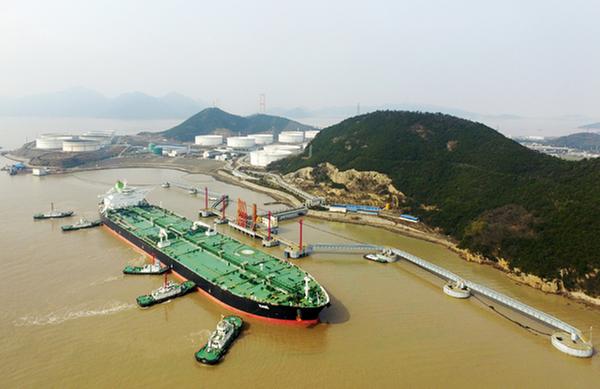New policies help boost Zhejiang's big oil industry
By SHI XIAOFENG in Zhoushan | China Daily | Updated: 2017-05-03 08:06
 |
| A 300,000-ton Panama oil tanker, carring crude oil from Iran, docks at a wharf of Zhoushan port on March 8. YAO FENG / FOR CHINA DAILY |
When the YiDa Five supply vessel left Sinopec Zhoushan Company's fuel depot at the Aoshan wharf in the China (Zhejiang) Pilot FTZ for Shanghai Yangshan Port on April 18, its target was Panama freighter Paraburdoo-and the task was to deliver as much as 1,350 metric tons of bonded fuel oil.
YiDa was laden with 5,000 tons of oil. Such an operation was made possible by the latest policies of Hangzhou Customs that came into being after the launch of Zhejiang FTZ.
YiDa Five could park at Yangshan Port after accomplishing its mission and wait for its next customers, to empty itself of its cargo.
Hangzhou Customs introduced 15 measures in response to the launch of the FTZ in April. Five of them are related to the bonded fuel oil trade, of which three benefited YiDa Five: One Ship Serves Multiple Vessels, One Depot for Multiple Ships and Cross-Regional Direct Supply, said Zhang Xiaoli, an officer with the Hangzhou Customs' Zhoushan Bureau.
According to her, YiDa Five loaded the bonded fuel oil from Aoshan's public oil depot.
"Bonded fuel oil is usually transported to the company's own storage depot first and then transferred to a fuel ship through an oil pipeline. The ship would unload the fuel oil into depots in Shanghai or other cities and freighters are fueled there," said Zhang.
"The new measures simplify procedures, save on time, storage and transport costs for our company," said Zhang Ji, assistant to the general manager of Sinopec Zhoushan.
She estimates 50 yuan ($7.3) can be saved per ton of bonded fuel oil now. "We provide 700,000 to 800,000 tons each year and that could save us up to 40 million yuan on annual operation costs."
Sinopec Zhoushan is among the first batch of 12 enterprises that were granted permission to operate in the newly launched FTZ.
Six of the seven main international oil transportation routes passing through China go across the waters of Zhoushan.
So, the island city of Zhoushan, where the FTZ is located, has the country's largest commercial oil storage and transportation enterprises and bonded oil reservoir, with an oil reserve capacity exceeding 19.5 million tons.
In 2016, Zhoushan supplied 1.06 million tons of bonded fuel oil, ranking second in China. Shanghai port topped the list.
According to Zhoushan Customs data, bonded fuel oil supplies reached 330,000 tons in the first quarter, up 58 percent year-on-year.
Bonded fuel oil trade is key to the FTZ as it completes the whole oil industry chain and energy commodity trade.
Ying Zhongmin, deputy director of the Zhoushan Municipal Development and Reform Commission, stressed that the FTZ is expected to be a driving force in the development of the oil trade.
"The development of the oil trade will add great value to the oil industry in Zhoushan. In the future, we'll allow several companies to engage in crude oil transactions," said Ying.
He said the zone is making efforts to cut unnecessary administrative procedures, to optimize internal structures and to take advantage of online platforms.
Singapore is the world's largest bonded marine oil supply port, an international oil trade center and the pricing center for Asian oil products.
"We should learn from them," said Xia Wenzhong, deputy director of the Zhoushan FTZ's Planning and Construction Group.
"The domestic bonded oil price is about $20 per ton higher than that of Singapore. China has seven of the world's top 10 largest container ports, yet many cargo ships that load or unload containers here choose to fuel at Singapore port due to the price gap and some policy factors," Xia said.
In 2016, 42,400 ships chose to take a detour to fuel oil at Singapore port, accounting for up to 20.27 percent of its total fueling amount.
"We are speeding up the construction of storage and refining infrastructure facilities and deepening policy research. We will provide some flexible measures and policies in the FTZ. All the passing cargo ships will have one more choice," said Xia.
























